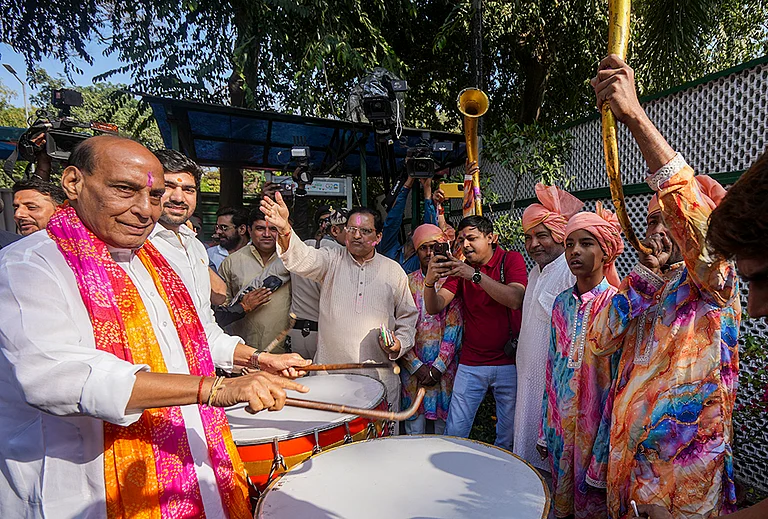My dream for India is to see the waters of the Brahmaputra kiss the waters of theCauvery. In all my years in journalism I was never able to use this awesome quote.Covering the ministry of defence made it very difficult to insert this somewhere. Eventhough it came from the most difficult man to meet in the ministry, Bharat Ratna Dr A.P.J.Abdul Kalam. I had gone to his office after work, and he was giving me copies of all thereports he had worked on for Indias technology vision of 2020. I then asked him whathis personal vision on a national scale was. Exposed to conversations on rocketry, thermalimaging and such other technologies, I had to ask him to explain this quotable quote.
It was very simple. He was envisioning a river map of India, much like a road map, inwhich various watercourses are linked to form a water grid. In that lies Indiassolution to the drought in Barmer, and simultaneously floods in Burdwan. This canalsystemat a national scalewill also ensure that India uses most of itsfreshwater, rather than letting it waste into the seas. At the same time, it will raisethe water table in areas where there has been an exponential increase in the developmentof tubewell irrigation along with an insufficient recharging of subsoil reserves. In hismind, Dr Kalam was also envisioning a potential for inland water transportation. News fromacross the border speaks of severe strain between Sindh and Punjab on sharing Induswaters. Figures for damage to the wheat crop in southern Punjab and Sindh are scary. Indiacould learn from that experience to formulate its own system. Nevertheless, at the end ofthe day, all of this, or even a part of it, would require tremendous political and socialcohesion to achieve. I already feel better now that I have shared Dr Kalams dream.
As mentioned last time around, the state government has commenced drought reliefmeasures with effect from January 15. The delay was occasioned primarily by financialconsiderations, for a failure of rains is apparent by the end of August. The later thecommencement, the lesser the amount the state government has to pay for these projects. Itis as simple as that, and at a time when pay and allowances for many of the departmentsare being managed through borrowings, it is well-nigh impossible to expect Jaipur to doleout funds unreservedly. The struggle for getting projects sanctioned is in full swing, andthe sarpanch who gets more than one for his panchayat should count himself, and hisvillages, very lucky indeed. Charges are also flying thick and fast about a partisanattitude within the administration in sanctioning the relief projects, in terms of whichpanchayat gets what project, and its value. There is a history to this.
One of the things that has amazed me no end while moving around the three districtsthat I cover is the quality of intellect and commitment at the district level. Thestereotype of the unmoving district collector who refuses to take a positive step, or thatof a bullying superintendent of policeboth hand in hand with the local goonsisnot reflective of the ground reality. Like most of what happens in India, there is a vastgrey area, within which slotting of roles cannot be so fixed and rigid. There arecertainly some who are irreparably unpleasant, but they are in a minority. What has beenan eye-opener is the fact that there is a difference in intellect and dedication betweenthe state cadre and those from the central services. There is no doubt about that, andwhat is particularly disturbing is that many from the state services behave morepolitically motivated than the politicians themselves.
Those from the central services are not afflicted to the degree that the local onesare, for obvious reasons I suppose. One of the collectors that I deal with is an immenselyintelligent person, and of the three SPs, two are from iit while the third is an mbbs.This is not to say that SPs are smarter than the collectors, just that the other two havebeen promoted from the state services. They are slower to react, and more prone tobuckling under pressure.
From the commitment at the district stage to what happens subsequently to these brightmen and women can only be called a depressing journey. Now that I see it before me, it iseasy to understand where we go wrong administratively. The Devikot incident mentioned sometime back was a revelation as to how the various levels of administration and policingrespond. And the grey area that envelops the boundaries of the legislature and theexecutive is where the problems lie. There are undefined roles at play, of the legislatorsans executive authority, and the administration sans legislative powers. Both are tryingto influence the other, and it is a balance of these two interests that gives us theadministration we have today. In that sense we have yet not evolved from the colonialtimes where the district magistrate entertained the requests of the native notables, anddispensed with the funds keeping an eye on their interests. This is exactly what is goingto happen with the drought of 2001.
(The writer stood for elections as the bjp candidate in Barmer, Rajasthan. He nowworks full-time in the constituency and is writing a column on life and development issuesin Barmer.)


















